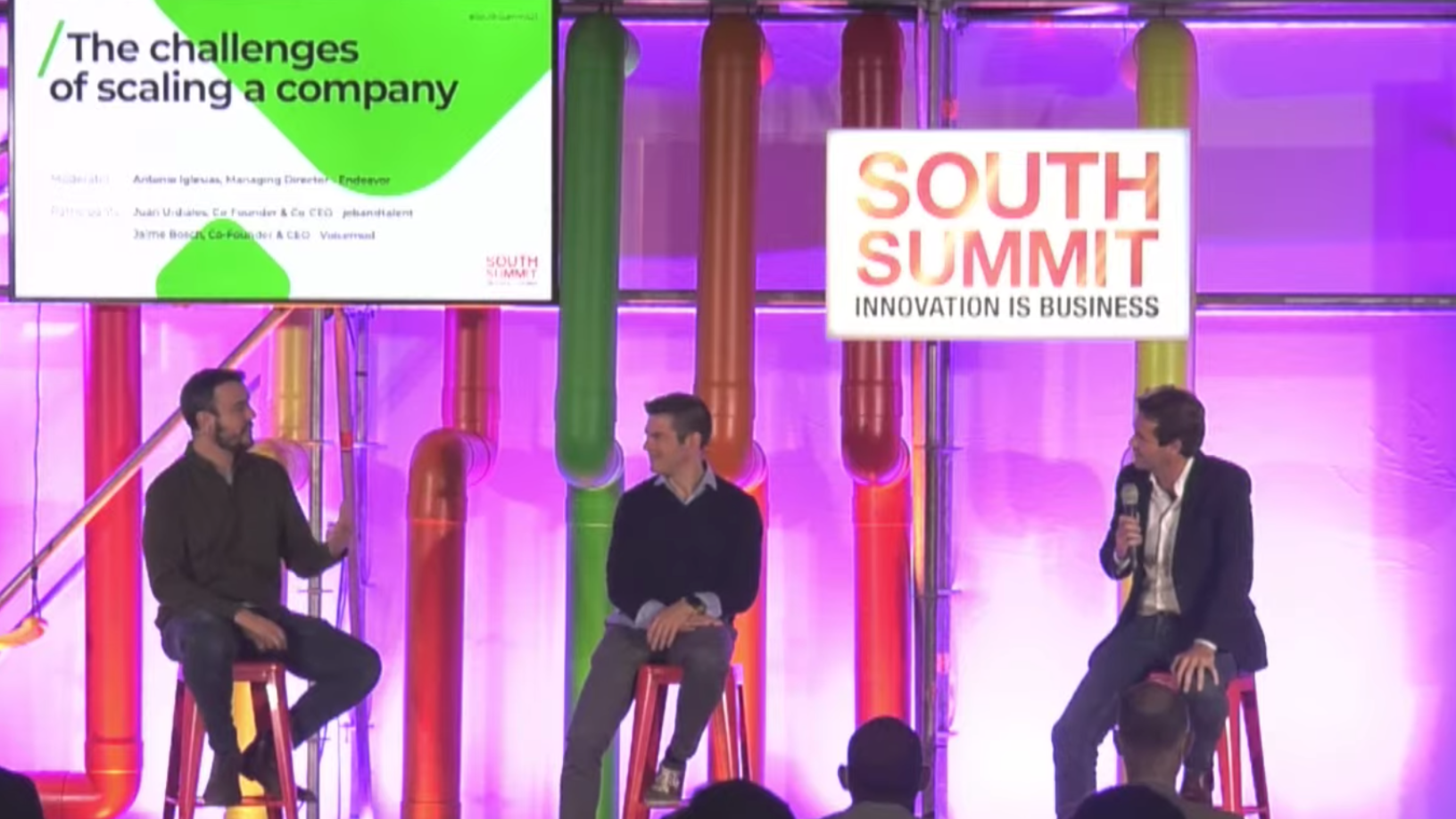Is founding and growing a deep tech startup different? What should an aspiring deep tech entrepreneur do when seeking to build and scale a company, team and community?
Speaking via videoconference at the Singapore Week of Innovation and Technology (SWITCH) conference on November 10, Jason Illian, Managing Director of Koch Disruptive Technologies (KDT), the VC arm of US conglomerate Koch Industries, discussed key strategies for deep tech startups in a fireside chat with Mark Worthington, Managing Director, at Klareco Communications.
An investor of deep tech startups, KDT’s portfolio extends across a number of sectors and includes autonomous drone company Percepto, immunology biotech player Immunai, cybersecurity firm Dragos and quantum computing firm QC Ware.
The following discussion has been edited for length and clarity.
Mark Worthington: How can deep tech founders find and attract good people? Especially if they haven’t been able to travel or go to any meaningful events for some time. How does one begin to build up a network of people who can really help?
Jason Illian: I once heard a pitch from an entrepreneur talking about the day when you can just pick up your phone and some random person will come pick you up in his car, and take you to where you're going. The people in the room were, like, that's crazy. But today, that's just ride-sharing, it's Uber or Lyft.
Or another time a guy said, what if you could rent out a room of your house, or rent out a couch? People were, like, what kind of psychopath is going to let you hang out in their house? Yet today, Airbnb has more rooms than every hotel on the planet.
These stories show that if you have a great idea, it's going to sound somewhat crazy at first. But those are the best ones. And by telling that story, getting your narrative right, and by continuing to iterate it time and again, people will come out of the woodwork to be part of it.
You’d want people who believe in your vision to come alongside you, because the best ideas are tough to implement. Any great story of a startup that we read about, which sounds like an overnight success, was probably in the background five or 10 years ago, fighting uphill, struggling, iterating, and making mistakes.
So whether you're just sitting in a tech company, or whether you're out in the middle of nowhere, on your own with a laptop, there's an opportunity to tell your story, and draw people who share your vision to join you. These days you can use blogs, you have video — there're a thousand ways, thanks to technology.
What advice would you give founders who have to compete for talent against the big boys, the Googles with their pay packages and perks?
I always tell people that if money is the only driving factor for someone, that's probably not the person you’d want on your team. People want to be part of a vision; they have things they want besides money. It helps to understand what’s important to them: whether it’s being part of the founding team, having a larger piece of the equity long term, or running a division that's going to help them grow.
There are so many things that startups can do because they are agile, fast and iterative, that the big boys just simply can't. If you're going to a big tech company, you're getting a role and you're going to stay in that lane. Why? Because there's 50,000 people in your firm, and that's your job.
But in an early startup, you get to wear multiple hats, you get to try things you wouldn't try otherwise. It’s thrilling. You get to grow personally.
I see a lot of people in big companies who are actually looking for roles in great startups. And it’s the job of the leadership of the startup to share their vision and tell these people, we want you to be a part of this. The startup has to get creative about what these people value. Do they value working from home? Being able to make decisions? All that will make up for the pay package that they would get at Google or Facebook.
Let’s say we start to build this team of likeminded people brought into the vision. To scale, deep tech startups will need backing, whether it’s investment or some disruptive industries behind them. How should they choose? Or how could they appeal to the right kind of investment partner?
Right now there's more money in the investing ecosystem than I've ever seen. There’s a good chance that entrepreneurs can get a check that even 10 years ago may not have been available.
And remember, it's not just venture capitalists. We often say VCs do the funding, but that's not always the case. There are angel investors that write smaller checks. There are family offices that typically write mid-sized checks, say $1m–10m. There's are CVCs like KDT, but there’re also hedge funds, pension funds and others in the investing ecosystem.
That said, you’d need to be looking for somebody who's more than just the check. The difference is, who can be not only a better investor, but a better partner? Who's going to walk alongside you and add value to your company, besides giving money?
That's really where I try to take entrepreneurs as soon as possible. It shouldn’t only be about how we, as investors, can help the company financially, but also how we can come alongside them. At KDT, we’ve built an entire team inside of our venture unit called Koch Labs, and their sole job, once we make an investment, is to help that company grow. That's even more important than the check – to have partners who are willing to get their hands dirty.
As an investor, you've got a certain horizon before you exit. The classic VC window is four to five years. In that context, what should companies in deep tech – where the horizon might be 10 years before you've got a solution that is ready – consider?
Not enough entrepreneurs ask themselves early on, how long is it going to take me, realistically, to build this company? If an entrepreneur tells me two years, in my mind I automatically think four. So just double the amount of time, double the amount they need. Because this stuff is hard.
I will say there’re many VCs that do operate with a window of four to seven years, before they want their money out. Koch Industries is different. We are a privately held company, it's our money. So if we're invested for five, 10, 15 years, we're okay with that, because that's how we were built. We believe that some of the best companies take time.
In healthcare and life sciences, a lot of the companies are not going to fit that window. If you look at what's happening in cryptocurrency, blockchain and new fintech, that's not going to fit nicely, either. You may grow your company, but that doesn't mean you're going to be ready for a liquidation event during that time.
It’s very important that entrepreneurs converse with investors upfront: what’s your time horizon, and what's mine? You’ve got to align those incentives, because if not, over time you're going to naturally want to keep growing your company and your investors are going to want to create liquidity.
Even if that happens, there are still options. There are some, like KDT and others, that can come in and buy out other investors. But if you think about timeframes upfront, it will make your life much, much easier.
Some founders may say they only need two years because they’re worried that if they say four, you'd be concerned as investor that another company could get there first, or that new technology could change and make their innovation redundant. They also worry that, along the way they might have to completely pivot, and how they’d need to convince an investor to go along with that.
Between the entrepreneur and investor, you need intellectual honesty and, what I call, cognitive flexibility. It's okay to come in and say, listen, we think it's going to take between two and four years because we need this bandwidth, and maybe I'm going to have to iterate to change course, I'm going to have to make adaptations based on what the market presents and what my competition is doing.
The best companies know when to win the tournament quarter – in the pivot. That sounds super exciting, but the reality is about being in the trenches, getting your hands dirty, and realizing you’ve got to change direction if the company is going to be successful. And the earlier you are in the game, the more likely you're going to have to make those iterations. Once you finally hit your stride, and you have launched products, the markets are reacting to them, then those changes become smaller, and more intuitive.
But finding your market fit and go-to-market strategy can be hard. So don't think that all the investors expect you to have it all figured out — we know you don't. We're looking for that intellectual honesty and the humility to know you need a partner to walk with you through all this.
Among the many pitches you've seen, what is it that sets the winners apart?
There are two or three things I look for. Firstly, the leaders. Not just one person, but a leadership team that's coming in with a shared vision and they're talking about it with passion. When we pepper them with questions, we see they're able to answer the whole lot because they've done their homework and know their space exceptionally well. And when you're trying to distract them with other things, they don't get distracted, they’re focused on solving the problem at hand.
If the CEO talks the entire time, while everybody just sits around the table, it makes me nervous. I'm looking for a leader that shares what he needs to, but then points to the CFO or head of product, and gets everybody talking, even if they disagree on the small details. That means they're being honest about the direction they're going and have that collaborative team-based approach that I'm looking for.
I'm also look for something that's very disruptive, meaning, it's going to change the way we do business, or the way that we live our lives. The Internet itself was highly disruptive, so was ride-sharing, or going to the moon.
Or when we talk about cryptocurrencies and changing the entire payment system, there are going to be certain people who don't believe. But these could be highly disruptive, game-changing ideas. We want companies that don’t just disrupt for disruption’s sake, but because it makes society better and improves people's lives.
Another factor is scalability. Can this truly be a big platform? Or is it just a nice side business? It's okay to have a great side business that provides for you and your family, but it would be harder for a large investor like ourselves, or big VCs, to invest in because we need to deploy a significant amount of capital.
What are the top things you’d want deep tech startups to take away from this session?
I always tell people: think big but start small. Start in your kitchen, your living room, your garage, wherever, and build the momentum from there. Have a big vision, but realize that you don't eat the whole elephant in one bite. It’s going to take multiple bites over multiple years to get to where you're going. You don't have to build it overnight.
It’s a fallacy that you've got to come all polished and perfect when you raise money. You don’t. You just need to be honest about where there are holes in your leadership team or your strategy, and work on filling them.
When most people pitch their business, they end up pitching it 10, 20, or 30 times before they find somebody that’s interested in investing. That's okay, because that's part of our art and craft of learning how to tell our story, of having a great narrative. It takes time to get that narrative right.
But once you do, people will start to buy in. After you get some investment, try to find traction. Try to find the little pieces that show the market is reacting positively to what you're building. Once you do that, you have the opportunity to scale.
We keep talking about this massive ecosystem. That's important. But I often think about it as three concentric circles: you have a community, which is tight, a network that's a little bit bigger, and then an ecosystem. You're talking to the ecosystem to tell your narrative and to bring people on board; but at the end of the day, you want that community — that tight knit-knit group, your team and people you're spending the most time with, to figure things out with you.










